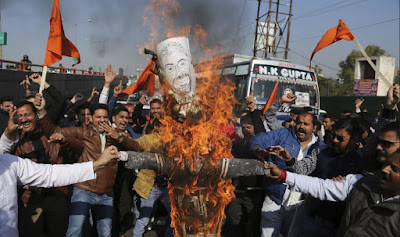The possibility of Sanjay Leela Bhansali’s
controversial new film opening in Britain has prompted threats against British
cinemas and film fans
By Sunny Malik
 |
|
Members
of India’s Rajput caste group in Jammu burn an effigy of film director Sanjay
Leela Bhansali in
protest at the release of Padmavati. Photograph: Channi Anand/AP
|
Acclaimed filmmaker Sanjay Leela Bhansali
directed an operatic version of a Sufi poem Padmavat at the Châtelet theatre in
Paris in 2008. He’s now turned that into a film, starring one of the biggest
names in Indian cinema, Deepika Padukone. Padmavati was due to open in cinemas
on 1 December. However, it’s currently embroiled in a controversy that has
spilled over to the UK.
It all started in January when Bhansali was
assaulted during the filming by a mob consisting of Karni Sena members, a
Rajput caste group. In Padmavati, the Rajput queen Padmini chose to kill
herself by self-immolation rather than be captured by the Muslim sultan,
Alauddin Khilji. It’s a story that has become a key part of Rajput history,
despite little evidence that Queen Padmini actually existed. However, when it
was rumoured that Bhansali had included a dream sequence depicting a romance
between Queen Padmini and Khilji, which he refuted multiple times, the Karni Sena
objected to the alleged distortion of history in the name of art.
Earlier this month, the group threatened to
cut off Padukone’s nose for her “indecent” performance in the movie. She was
given police protection following a bounty that was placed on her head for
approximately £500,000 by a member of the political Samajwadi party. This
bounty was increased last week by a member of India’s Hindu nationalist ruling
party, BJP, offering £1.13m to anyone who beheads Padukone and Bhansali.
It was of course horrifying to see these
threats made on national television, but it was more disappointing still to see
that neither of Padukone’s co-stars, Shahid Kapoor and Ranveer Singh, publicly
defended and supported her. This apparent lack of unity within the Indian film
community has been a common occurrence during past controversies, and is surely
part of the reason the government does not take a strong stance on such
matters.
The Indian Certification Board also refused
to certify the movie for its Indian release. Last Sunday, the opening of
Padmavati was indefinitely postponed by producers Viacom 18, without consulting
Bhansali or the cast. Several states such as Rajasthan have already banned the
film, despite there being no legal basis for doing so.
And then the British Board of Film
Classification classified the film for its UK release with a 12A rating. Word
spread as the classification implied that the UK would get to see the film
before India, and a threat was made against UK cinemas on Indian national
television.
It was breaking news on Indian TV channels. A
Karni Sena leader went on Republic TV and said: “We will go to an international
court and call for the film to be banned. I call on my Rajput brothers and
Hindus in the UK to protest against screening the film there … I would have
even gone myself to the UK but let me tell you, whichever cinema screens the
film will be burned.”
Paramount Pictures, who has the distribution
rights, confirmed that there will be no 1 December opening as planned. However,
it failed to confirm whether the classification was submitted prior to
postponing the film in India.
It’s shocking that a country we have such
close ties with tolerates statements inciting violence against UK cinemas and
UK citizens, and that our government hasn’t reacted. I’ve written to the Home
Office, the British high commission in India and several MPs demanding that
Karni Sena members be banned from entering the UK. Additionally, the government
must clearly communicate to the Indian government that threats of this nature
will not be tolerated. Neither will our freedom of choosing a film to watch be
compromised due to local politics in India. The ball is now in the UK
government’s court.
• Sunny Malik is a freelance journalist and
social media manager based in London, focusing on Bollywood films and Indian
film stars

